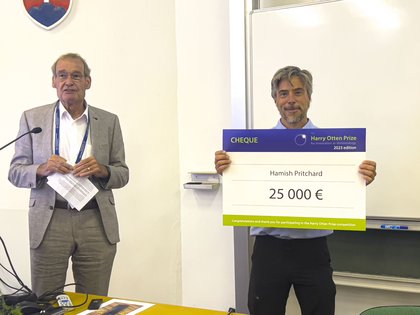Harry Otten Prize for Innovation in Meteorology 2023 awarded to Hamish Pritchard for his idea Lakes as snowfall sensors.
The Harry Otten Prize for Innovation in Meteorology has been awarded for the sixth time. During the Annual Meeting of the European Meteorological Society currently taking place in Bratislava, the jury announced that Hamish Pritchard from the British Antarctic Survey (U.K.) has won the first prize of 25,000 Euro. His idea, Lakes as snowfall sensors: Solving the precipitation problem in the mountain cryosphere, entails that lakes can be used as pressure-sensing surfaces to yield accurate observations of the water content of snowfall simply, cheaply, autonomously, and over large areas. With standard water-pressure sensors submerged on a lakebed, the mass of winter snow precipitation as it reaches the lake surface can be recorded, while avoiding biases that appear with other instruments that interact with snow as it falls or accumulates.
The winner of the prize was selected from three finalists. The other two finalists received 2,500 Euros for their ideas.
Philipp Gasch from the Karlsruhe Institute for Technology and his co-workers James Kasic and Zhien Wang (both at University of Colorado) presented their idea called “A novel airborne Doppler lidar system design for high-resolution wind measurements”. They propose a new airborne Doppler lidar onboard research aircraft, aiming to provide higher measurement accuracy and spatial resolution, in combination with a simplified and more robust system design. Its high resolution and accuracy allows for the retrieval of turbulence properties, such as vertical wind variance and turbulent kinetic energy.
A team composed of Irene Schicker, scientist at GeoSphere and Marianne Bugelmayer-Blaschek and Jasmin Lampert (both at the Austrian Institute of Technology) proposed to refine seasonal forecasts in their idea Weather impacts on renewables & agriculture: explainable AI for hyperresolution downscaling for S2S. While extended range and seasonal forecasts are rapidly developing, they lack the spatial resolution necessary for applications operating at a smaller scale. Since dynamic downscaling is computationally expensive, they aim to develop a novel, computationally inexpensive, transferable, and physics-aware post-processing methodology and establish trustworthiness within the scientific community and the public, and assess transferability to untrained regions.
The jury received 18 applications for the prize with lead authors from at least 14 different countries in Europe, Africa, Australia, and the U.S.A. The Harry Otten Prize is awarded every two years. More information is available at the website at www.harry-otten-prize.org.
Pam Emch, Chair of the Board of the Harry Otten Foundation, commented, “The Board was gratified to see the number of diverse and interesting ideas that were submitted. The idea put forward by Hamish Pritchard can help cost effectively address and improve the quantification of precipitation that falls as snow. An improvement in this measurement has applicability not only in meteorology, but also in water resources planning and management and could potentially be utilized for remote sensing instrumentation/observation calibration/validation.”
About Harry Otten and the Harry Otten Foundation
Harry Otten has been active in meteorology for more than 40 years, 25 years of which he served as founder and director of Meteo Consult (now integrated in DTN). In those 25 years the company grew from 5 starters to more than 270 people in more than 10 countries, making it the largest private weather company in Europe and one of the leading weather companies in the world. Harry sold his company between 2005 and 2011 and wanted to express his gratitude to the meteorological community by creating a fund that will be used to reward innovative ideas in meteorology.

